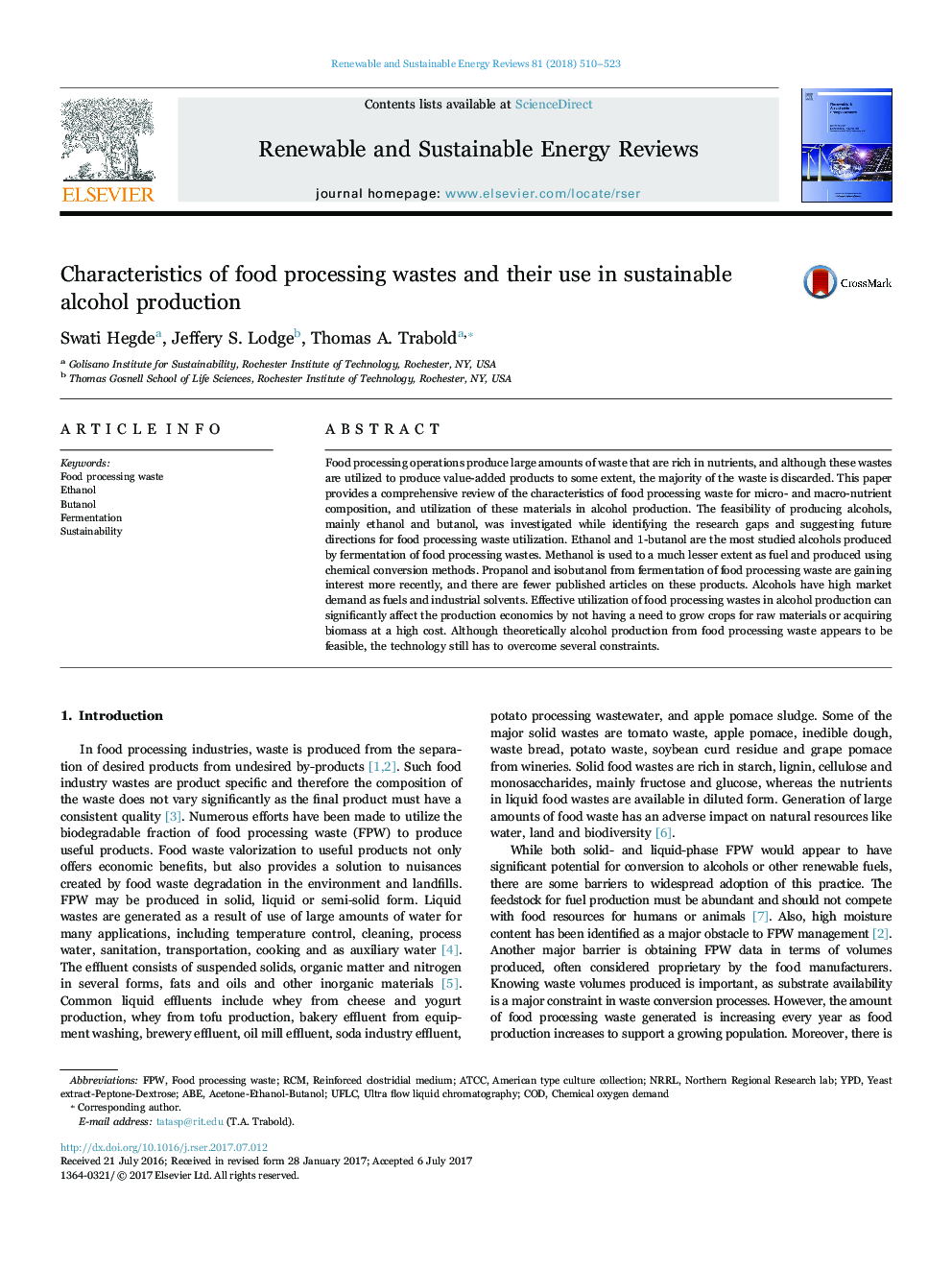| کد مقاله | کد نشریه | سال انتشار | مقاله انگلیسی | نسخه تمام متن |
|---|---|---|---|---|
| 5481976 | 1399348 | 2018 | 14 صفحه PDF | دانلود رایگان |
عنوان انگلیسی مقاله ISI
Characteristics of food processing wastes and their use in sustainable alcohol production
ترجمه فارسی عنوان
ویژگی های زباله های مواد غذایی و استفاده از آنها در تولید الکل پایدار
دانلود مقاله + سفارش ترجمه
دانلود مقاله ISI انگلیسی
رایگان برای ایرانیان
کلمات کلیدی
RCMABEUFLCATCCFPWYPdNRRLEthanol - اتانولButanol - بوتانولFermentation - تخمیر chemical oxygen demand - تقاضای اکسیژن شیمیاییFood processing waste - زباله های مواد غذاییYeast extract-Peptone-Dextrose - عصاره مخمر-پپتون-دکستروزAmerican Type Culture Collection - مجموعه فرهنگی نوع آمریکاییSustainability - پایداریCod - کادو
ترجمه چکیده
عملیات پردازش مواد غذایی مقدار زیادی از زباله های غنی از مواد مغذی را تولید می کنند و اگر چه این زباله ها برای تولید محصولات با ارزش افزوده مورد استفاده قرار می گیرند، اکثریت زباله ها از بین می روند. این مقاله یک بررسی جامع از ویژگی های زباله های مواد غذایی برای ترکیب میکرو و مواد مغذی و استفاده از این مواد در تولید الکل ارائه می دهد. در حین شناسایی شکاف تحقیق و پیشنهاد مسیرهای آینده برای استفاده از زباله های مواد غذایی، امکان تولید الکل ها، عمدتا اتانول و بوتانول مورد بررسی قرار گرفت. اتانول و 1-بوتانول، بیشترین مطالعه شده از الکل های تولید شده توسط تخمیر زباله های مواد غذایی می باشد. متانول به میزان بسیار کم به عنوان سوخت استفاده می شود و با استفاده از روش های تبدیل شیمیایی تولید می شود. پروپانول و ایزوبوتانول از تخمیر زباله های مواد غذایی به تازگی در حال افزایش است و مقالات منتشر شده در این محصولات کم است. الکل ها دارای تقاضای بازار بالا به عنوان سوخت و حلال های صنعتی هستند. استفاده موثر از زباله های پردازش مواد غذایی در تولید الکل می تواند به طور قابل توجهی بر اقتصاد تولید تاثیر بگذارد بدون آنکه نیازی به رشد محصولات برای مواد خام یا تولید زیست توده با هزینه بالا باشد. اگر چه به لحاظ نظری، تولید الکل از مواد زائد تولید مواد غذایی امکان پذیر است، اما هنوز تکنولوژی باید بر چندین محدودیت غلبه کند.
موضوعات مرتبط
مهندسی و علوم پایه
مهندسی انرژی
انرژی های تجدید پذیر، توسعه پایدار و محیط زیست
چکیده انگلیسی
Food processing operations produce large amounts of waste that are rich in nutrients, and although these wastes are utilized to produce value-added products to some extent, the majority of the waste is discarded. This paper provides a comprehensive review of the characteristics of food processing waste for micro- and macro-nutrient composition, and utilization of these materials in alcohol production. The feasibility of producing alcohols, mainly ethanol and butanol, was investigated while identifying the research gaps and suggesting future directions for food processing waste utilization. Ethanol and 1-butanol are the most studied alcohols produced by fermentation of food processing wastes. Methanol is used to a much lesser extent as fuel and produced using chemical conversion methods. Propanol and isobutanol from fermentation of food processing waste are gaining interest more recently, and there are fewer published articles on these products. Alcohols have high market demand as fuels and industrial solvents. Effective utilization of food processing wastes in alcohol production can significantly affect the production economics by not having a need to grow crops for raw materials or acquiring biomass at a high cost. Although theoretically alcohol production from food processing waste appears to be feasible, the technology still has to overcome several constraints.
ناشر
Database: Elsevier - ScienceDirect (ساینس دایرکت)
Journal: Renewable and Sustainable Energy Reviews - Volume 81, Part 1, January 2018, Pages 510-523
Journal: Renewable and Sustainable Energy Reviews - Volume 81, Part 1, January 2018, Pages 510-523
نویسندگان
Swati Hegde, Jeffery S. Lodge, Thomas A. Trabold,
